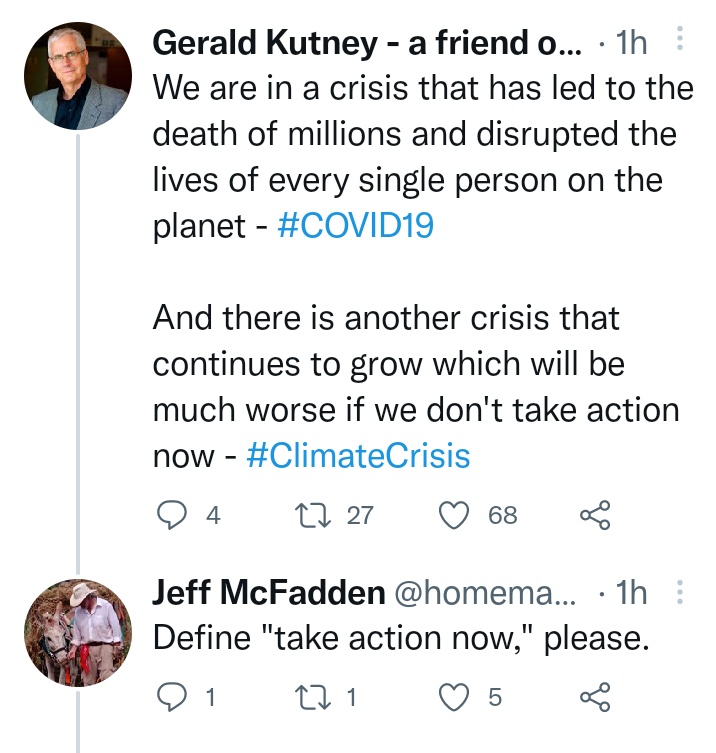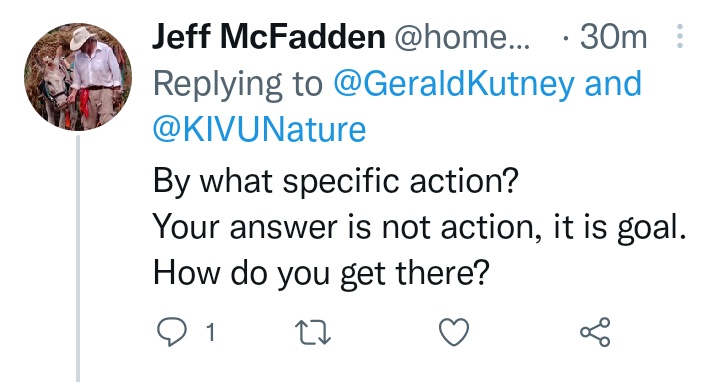
My theory:
If there is any possibility of humankind escaping the worst of the doom we have signed up for (not a sure thing) that possibility lies in maximizing the biological carbon cycle.
There is lots of room for growth. We've killed and paved much of it.
If there is any possibility of humankind escaping the worst of the doom we have signed up for (not a sure thing) that possibility lies in maximizing the biological carbon cycle.
There is lots of room for growth. We've killed and paved much of it.
2. Reducing our emissions will be an inevitable output of any serious effort to restore / regenerate / reactivate the global ecosystem / biosphere / carbon cycle.
All this high energy high volume giant scale machinery everyone wants to replace fossil fuels with - that's opposite.
All this high energy high volume giant scale machinery everyone wants to replace fossil fuels with - that's opposite.
3. We already have too much carbon in the atmosphere. I'm not going to defend that point.
If we want to survive, we take action to reduce that carbon directly, not by machinery that we have to emit carbon to build, but by photosynthesis at every level supported by other life.
If we want to survive, we take action to reduce that carbon directly, not by machinery that we have to emit carbon to build, but by photosynthesis at every level supported by other life.
4. This is not about "trees" or "grass" or "algae" or any other silver bullet.
The silver bullet system has profoundly failed us.
We've broken the shit out of the global ecosystem, and thrown away zillions of parts, none of which we knew what did.
All the carbon in the air today
The silver bullet system has profoundly failed us.
We've broken the shit out of the global ecosystem, and thrown away zillions of parts, none of which we knew what did.
All the carbon in the air today
5. Was put in the ground by the ecosystem once already.
It took maybe millions of years. If we're as smart as we claim to be (a dubious proposition) we can figure out how to plant native everywhere, food bearing, reintroducing beavers like there was no tomorrow (a possibility)...
It took maybe millions of years. If we're as smart as we claim to be (a dubious proposition) we can figure out how to plant native everywhere, food bearing, reintroducing beavers like there was no tomorrow (a possibility)...
6. Every living thing is made of a lot of carbon and other elements. But lots of carbon. And right now Earth is short about 90% of its necessary life at all levels, replaced with plastic, poison, pavement, and unspeakable greed.
6. Slowing down is necessary because what this is going to require is careful attention to every square inch of Earth, to encourage and maximize its natural productivity.
7. This is not going back to anything. This is a planet and society which has never existed since the agricultural revolution. It's the road not taken 6,000 years ago.
We should have left the annual grasses in the flood plain where the functioning ecosystem grew them. Used that.
We should have left the annual grasses in the flood plain where the functioning ecosystem grew them. Used that.
8. Cities started there, when we carried the annual grasses into the hills, and killed the living food system and made one man owner of all it could produce.
Humans lived other ways, happily. The annual grasses fed their slaves, then starved them, starving the land, and they
Humans lived other ways, happily. The annual grasses fed their slaves, then starved them, starving the land, and they
9. Went and conquered some more new land to plow under and plant annual grasses on.
OK. All done. We did that. There's pretty near nothing left to conquer, and we're either on fire or under water, and it's done. Run its course.
There is no reason on the face of this Earth
OK. All done. We did that. There's pretty near nothing left to conquer, and we're either on fire or under water, and it's done. Run its course.
There is no reason on the face of this Earth
10. No reason whatsoever, that human beings need to travel faster than their evolved biological selves can travel, perhaps aided by animals. There is no reason whatsoever why human beings need to make plastic, or fly in airplanes. We do this because it's fun, and exciting,
11. But speed and scale are irrevocably entwined, and there's either room for a biosphere, or there's room for us to go a mile a minute as a norm, and fly a million pounds across the Pacific Ocean - but there's not room for both.
12. A human community can, and it can be proven this has been done, live in such a way that the carbon content of the physical landscape increases steadily, and from it they obtain all needed food, fiber, and energy. While endlessly maintaining and adding productivity.
14. It doesn't look anything like today. It doesn't have jet planes and the people think the whole idea was insane and thing we were massive fools. People trade worldwide at animal caravan, horse and buggy, sailing ship speeds, and it works because of course it does. It did.
15. But we do it smarter. I use the term permaculture, but I don't mean by some rules called permaculture, I mean ecosystem gardening for its, and our, mutual benefits.
We evolved here. This is known to work. We don't have to grunt and scratch our armpits. Speed does not make us.
We evolved here. This is known to work. We don't have to grunt and scratch our armpits. Speed does not make us.
16. We will never run out of building materials. We've got a whole nation full of concrete to pull up and plant back. Never build anything taller than you can stack concrete stones from the highway.
I know we really feel cool and superior and smarter than everyone else ever,
I know we really feel cool and superior and smarter than everyone else ever,
17. But the rest of them left us a habitable planet, and we're not managing to accomplish the same.
18. Humans form communities. Homo Erectus had tribes. We are more every <person> for <yourpronounhere>'s self than any healthy human society ever.
And we're not one. We have mass murders daily. This is emphatically *not* a healthy society.
Any small group of young humans - or one
And we're not one. We have mass murders daily. This is emphatically *not* a healthy society.
Any small group of young humans - or one
19. Pick a spot and heal it. Slow down. We're stuck inside this culture and machine, but work to always be on the small, slow, carbon sequestering side.
Be aware of energy.
Nobody else is going to do this. If you say "people won't" you're saying "I won't, because other people."
Be aware of energy.
Nobody else is going to do this. If you say "people won't" you're saying "I won't, because other people."
20. Be sand in the gears. Slow the machine, just some, all the time. Drive five miles an hour slower than everyone else. Obey the speed limit. But most of all, see Earth. See life. See its presence and its absence. Observe how the plants along the roadside are changing. Different
21. I know it's probably hopeless, but I'd like to see somebody try. A movement, like we hippies tried to do.
We didn't understand our problems - we thought the EPA was a solution.
Once you make the poison, there's no point in making laws against throwing it away. It's going.
We didn't understand our problems - we thought the EPA was a solution.
Once you make the poison, there's no point in making laws against throwing it away. It's going.
22. The high speed economy as it operates now could not exist without plastic.
So quit sniveling about the oceans. We're not going to do anything about them until we have to.
This is the ultimate clash of civilizations. The agricultural / industrial revolution vs Garden of Eden.
So quit sniveling about the oceans. We're not going to do anything about them until we have to.
This is the ultimate clash of civilizations. The agricultural / industrial revolution vs Garden of Eden.
23. It appears to me that parts of the high speed economy are already failing. There sure are a lot of empty shelves at the Walmart.
The old Walmart wasn't big enough, but now they can't keep this one full. Ever. No day. Not even sorta.
The old Walmart wasn't big enough, but now they can't keep this one full. Ever. No day. Not even sorta.
24. I went with several thousand dollars ready to spend, and tried to buy a commercial walk-behind 4 foot mower, which I use to maintain my land, and no manufacturer could produce one.
Either metals or electronics unavailable.
Price of steel has shot sky high.
Cos this:
Either metals or electronics unavailable.
Price of steel has shot sky high.
Cos this:

25. I would say that the failure of the high speed economy, like good ol' climate change herself, is a feature of life today, not some future event.
Takes a long time to fall down a lot of stairs.
Takes a long time to fall down a lot of stairs.
26. I was able to purchase a donkey drawn four foot mower. It will be a couple months before it's ready, but the technology is still functioning. Price of the mower has gone up $2,000.00 since I started looking 18 months ago. Steel. Price of steel.
$300.00 in six weeks.
$300.00 in six weeks.
27. But my order is in now. My steel is bought. Next spring I'll be laying carbon based grass on the ground to rot and add carbon to the soil at a drastically reduced energy / emissions cost using food energy, cycling the nutrients.
28. Suppertime. Later.
• • •
Missing some Tweet in this thread? You can try to
force a refresh










